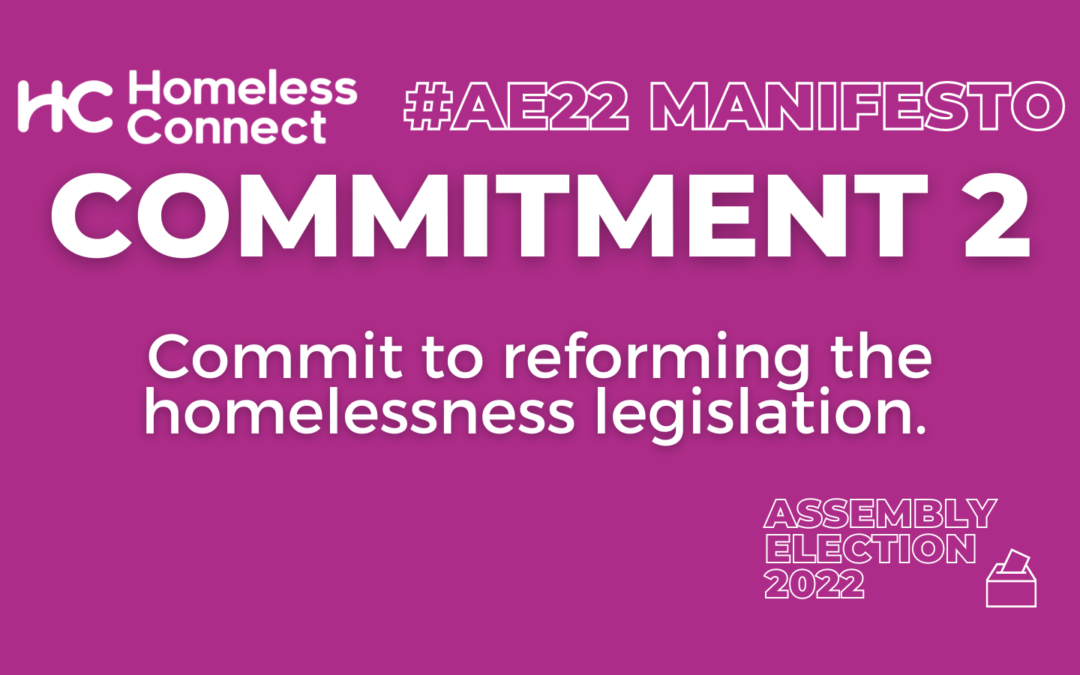In the run-up to the Assembly election coming on Thursday May 5, Homeless Connect developed a manifesto to take to political parties putting forward candidates.
We worked with our members and our policy forum to develop the manifesto. It includes ten policy proposals which, if enacted, would make a real difference in preventing and reducing homelessness here.
As polling day nears, we are going to publish a series of blogs unpacking the ten proposals and explaining why they matter.
Go here for Part 1.
NUMBER TWO
Commit to reforming the homelessness legislation to:
- Strengthen protections for those experiencing homelessness and allow earlier interventions to prevent homelessness occurring.
- Introduce a statutory duty requiring Executive Departments to work together to prevent and reduce homelessness.
The key piece of legislation governing homelessness in Northern Ireland is the Housing (NI) Order 1988.[1] The order sets out the duties and obligations of the Housing Executive towards people who become homeless or are threatened with homelessness. This legislation was passed a generation ago under Direct Rule and saw NI mirror the legal position in England, Scotland and Wales enacted through the Housing (Homeless Persons) Act 1977.[2]
It is important to stress that there is nothing wrong with maintaining old legislation if it remains fit for purpose. Four of the original clauses of the Magna Carta of 1217 remain in law today as they remain effective.[3] The difficulty with the Housing (NI) Order 1988 is that it is no longer fit for purpose.
The reason for this is that the Order introduced a legislative framework which largely responds to homelessness after it occurs rather than proactively seeking to prevent it before it happens. This society needs a legislative framework which assists our statutory bodies and the voluntary sector in homelessness prevention rather than perpetuating a reactive approach. Legislative reform to this end can be achieved.
England, Scotland and Wales recognised the deficiencies in the legal framework which continues to govern homelessness here.[4] All three jurisdictions have introduced substantial reforms to the legislation governing homelessness in the past two decades. The reforms implemented in each jurisdiction differ in their specifics, but they share an emphasis on preventing homelessness rather than reacting to it.
Legislation in and of itself is not a silver bullet. The key is how it is implemented. However, an effective legal framework which is well considered can shift the direction of policy and help produce better outcomes.
One crucial measure which would need to be included in new legislation is a statutory duty to require Executive Departments to work together. We know from experience and from our members that siloed thinking and ways of working within government departments have had a negative impact on this society’s response to homelessness.
However, the experience of responding to the Covid pandemic has illustrated what effective interdepartmental working can achieve. A legal duty to work together would have a positive impact on service users experiencing homelessness and service providers. It could help pave the way for more joint commissioning of services to achieve shared goals and to better meet people’s needs.
As we go forward, we can learn from the reforms introduced in other jurisdictions as we look to develop a new legislative framework. It is time for new, fit-for-purpose legislation. We need our political parties to grasp the nettle and drive forward change.
[1] https://www.legislation.gov.uk/nisi/1988/1990/contents
[2] https://www.legislation.gov.uk/ukpga/1977/48/enacted
[3] https://www.parliament.uk/about/living-heritage/evolutionofparliament/originsofparliament/birthofparliament/overview/magnacarta/magnacartaclauses/
[4] See in England, The Homelessness Reduction Act 2017, https://www.legislation.gov.uk/ukpga/2017/13/contents/enacted, in Scotland, The Homelessness etc. (Scotland) Act 2003, https://www.legislation.gov.uk/asp/2003/10/contents and in Wales, The Housing (Wales) Act 2014, https://www.legislation.gov.uk/anaw/2014/7/contents/enacted.


